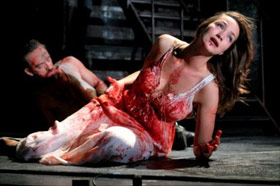
| HOME |
| NERVE |
| REVIEWS |
| ARCHIVE |
| EVENTS |
| LINKS |
| ABOUT US |
| CONTRIBUTORS |
| BACK ISSUES |
| CONTACT US |
 The Changeling
The Changeling
Written by Thomas Middleton and William Rowley
Liverpool Playhouse (5th-11th
November 2007)
Nottingham Playhouse Theatre Company
Reviewed by Colin Serjent
This was a mesmerising adaptation of a Jacobean revenge tragedy, full of bloodletting, lust, high intrigue and duplicity - nothing much changes in life, does it?
The Changeling, first performed in 1622 (shortly after the death of Shakespeare) contains myriads of wonderfully constructed prose worthy of the Bard himself.
There is a sub-plot - which is often humorous - within the play alongside the main plot - which is stark and harrowing - with the production relying on only one stage set, serving as both castle and asylum.
The main plot centred on Beatrice-Joanna, expertly played by Anna Koval, despite it being her first professional theatre engagement since graduating from RADA, who wants to wed Alsemero (Gideon Turner), even though her father Vermandero (Ken Bones) is adamant that she should instead marry Alonso de Piracquo (Gabriel Fleary).
She adopts a drastic way to prevent this happening, by enlisting her servant, the deformed Deflores (Adrian Schiller) - who will go to any lengths to win the affections of his ladyship, even though she despises him - to kill Piracquo. His overwhelming sexual desire for her leads him to commit the atrocity, with dire consequences for the two protagonists.
Within the sub-plot there is also a large degree of sexual desire, which results in a less tragic outcome. Franciscus (Leon Williams) and Antonio (Geoffrey Lumb) both obsessed with Isabella (Marianne Oldham), the wife of the asylum keeper Albius (Terrence Hardiman), pretend to be insane so they can be incarcerated in the madhouse, to enable them to try to win her affections.
Albius' servant Lollio, comically played with panache by David Cardy, also lusts after her, but Isabella, against the odds, does not succumb to temptation.
With the villainy ever present within the setting of the castle, it came as little surprise that the production ended on a very bloody note - very Shakespearean.